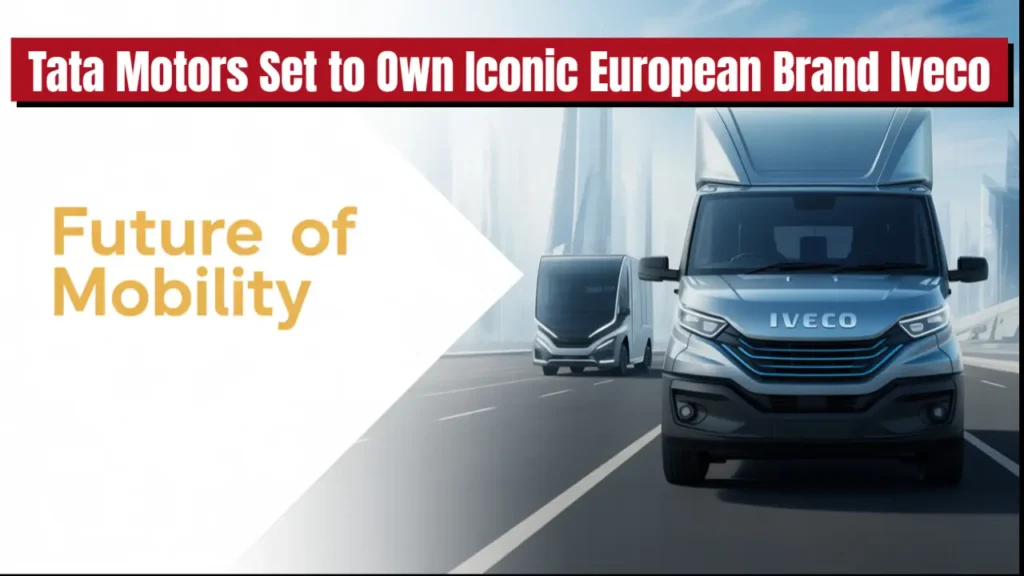Tata Motors is making headlines with its biggest-ever automotive deal—its plan to acquire Italian commercial vehicle maker Iveco from the Agnelli family-owned Exor for approximately $4.5 billion (₹37,500 crore). The historic move aims to transform Tata Motors into a major global player in the commercial vehicle (CV) space. The deal, expected to be announced after board meetings scheduled on July 30, will surpass the company’s 2008 Jaguar Land Rover (JLR) acquisition and become the second-largest deal ever by any Tata Group company, trailing only the 2007 Corus Steel acquisition.

Tata Motors Deal Structure and Strategic Objectives
Under the proposed terms, Tata Motors will first acquire Exor’s 27.1% stake in Iveco, followed by a tender offer for the remaining shares, excluding Iveco Defence Vehicles (IDV)—which is being spun off or sold separately due to foreign ownership restrictions on defense assets in Italy.
The transaction is expected to be executed through a Dutch special-purpose vehicle (SPV) fully owned by Tata Motors. The Indian automaker is being advised by Morgan Stanley, while Goldman Sachs and legal firm Clifford Chance represent Exor and Iveco.
This acquisition is seen as a strategic push by Tata Motors to quadruple its CV revenues, strengthen its presence in Europe, and access mature powertrain platforms and technology.
Market Reaction and Tata Motors Share Price Performance
Despite the long-term promise, the market reacted cautiously. Tata Motors’ stock dipped 3.7% to 4% on July 30, trading around ₹665–₹666 on both the NSE and BSE. This marks a 10% decline year-to-date and a staggering 42% fall from its July 2024 peak of ₹1,179.
Analysts cite concerns over the deal’s size, integration risks, and margin pressures. Iveco’s commercial vehicle margins sit at ~5.6%, significantly lower than Tata Motors’ ~9.1%, sparking questions about earnings dilution. However, experts also note that if successfully executed, the acquisition could position Tata Motors as a formidable global CV player.
Strategic Landscape and Regulatory Challenges
The acquisition is being closely monitored by the Italian government, given its implications for domestic industry, technology, and employment. Authorities may evaluate the transaction under Italy’s “golden power” laws, designed to protect key national industries from foreign takeovers.
Despite potential hurdles, the deal reflects Tata Motors’ ambition to scale its CV revenue from ₹75,000 crore to over ₹2 lakh crore, leveraging Iveco’s global footprint and engineering prowess.
Tata Motors is also actively expanding its electric vehicle (EV) line-up, recently launching models like:
- Tata Curvv EV
- Tiago EV
- Punch EV
- Nexon EV
These vehicles are now entering international markets such as Sri Lanka and Mauritius.
In addition, the Altroz hatchback received a major update in May 2025 with features like LED lighting, a digital instrument cluster, and six airbags as standard. The Harrier EV, launched in June, boasts a 627 km range, AWD, and top-tier safety with a 5-star Bharat NCAP rating.
Outlook: Opportunities vs Risks
Growth Opportunities
- Immediate scale in European markets.
- Access to high-end CV technologies and platforms.
- Strategic global positioning in the commercial vehicle space.
Risks and Concerns
- Complex integration between Indian and European operations.
- Margin pressure due to lower profitability at Iveco.
- Political and regulatory uncertainties, especially in Italy.
Analysts remain divided: Some see this as a value-buying opportunity, while others warn it may be a value trap, especially with ongoing challenges in Tata’s JLR division and macroeconomic headwinds.
Conclusion
With the $4.5 billion Iveco deal, Tata Motors is placing its boldest global bet yet. While the acquisition could redefine its commercial vehicle business and global stature, success will depend on seamless integration, regulatory approvals, and margin recovery. Investors are keeping a close eye—hopeful about the strategic potential but wary of the financial and political risks.
F.A.Q.
– What is the value of the Tata Motors–Iveco deal?
The deal is valued at approximately $4.5 billion (₹37,500 crore), making it Tata Motors’ largest automotive acquisition to date and the second-largest deal in the history of the Tata Group.
– What exactly is Tata Motors acquiring from Iveco?
Tata Motors plans to acquire Exor’s 27.1% stake in Iveco and then make a tender offer for the remaining shares, excluding Iveco’s defense business (IDV) due to regulatory restrictions on foreign ownership in defense sectors.
– Why did Tata Motors’ share price fall after the acquisition news?
Tata Motors shares fell around 3.7–4%, trading near ₹665, due to investor concerns over the size of the deal, integration risks, lower Iveco margins, and geopolitical uncertainties—especially with Italian regulatory oversight.
– Who currently owns Iveco, and why is it being sold?
Iveco is currently owned by Exor, the investment holding company of the Agnelli family (which also controls Ferrari and Stellantis). Exor is streamlining its portfolio and exiting non-core businesses like commercial vehicles.
– What will happen to Iveco’s defense unit (IDV)?
The Iveco Defence Vehicles (IDV) unit, which contributes about 13% of Iveco’s EBIT, will be spun off or sold separately. This is due to regulatory restrictions on foreign ownership of defense assets in Italy.
Also read:-